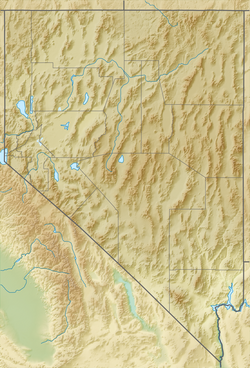The Sunrise Formation is a geologic formation in Nevada. It preserves fossils dating back to the Hettangian to Sinemurian stages of the Early Jurassic period.[1]
| Sunrise Formation | |
|---|---|
| Stratigraphic range: Hettangian-Sinemurian ~ | |
| Type | Formation |
| Sub-units | Ferguson Hill & New York Canyon members |
| Overlies | Gabbs Formation |
| Lithology | |
| Primary | Limestone |
| Other | Shale, siltstone, sandstone |
| Location | |
| Coordinates | 38°30′N 118°06′W / 38.5°N 118.1°W |
| Approximate paleocoordinates | 19°30′N 56°12′W / 19.5°N 56.2°W |
| Region | Nevada |
| Country | |
| Extent | Gabbs Valley Range |
Fossil content
editAmong others, the following fossils have been reported from the formation:
- Ammonites
- Bivalves
- Echinoids
See also
editReferences
editBibliography
edit- Taylor, D.; Guex, J. (2021), "Early Sinemurian ammonoids and biochronology of the Sunrise Formation, New York Canyon, Mineral County, Nevada", New Mexico Museum of Natural History and Science Bulletin, 82: 371–391
- Taylor, D.; Guex, J. (2002), "The Triassic/Jurassic System boundary in the John Day Inlier, east-central Oregon", Oregon Geology, 64: 3–28
- Taylor, D.G (1998), "Late Hettangian-early Sinemurian (Jurassic) ammonite biochronology of the western Cordillera, United States", Geobios, 31 (4): 467–497, Bibcode:1998Geobi..31..467T, doi:10.1016/S0016-6995(98)80120-4
- Guex, J (1995), "Ammonites hettangiennes de la Gabbs Valley Range (Nevada, USA)", Mémoires de Géologie (Lausanne), 27: 1–131
- Poulton, T. P (1979), "Jurassic Trigoniid Bivalves from Canada and Western United States of America", Geological Survey of Canada Bulletin, 282
- Jesionek-Szymanska, W (1970), "On a new pygasterid (Echinoidea) from the Jurassic (middle Lias) of Nevada, U.S.A.", Acta Palaeontologica Polonica, 15: 411–419

